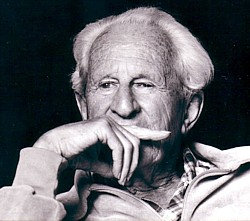
This review was available on the site now-defunct website (http://www.stanford.edu/~flsamson/review-marcuse-essay.html) from ca. 2001 to spring 2004.
It was written by Frank Samson III, a sociology graduate student at Stanford University.
Archived on the marcuse.org, October 2004.
Published in 1969 in the midst of the ferment of popular uprisings and movements across the globe, An Essay on Liberation written by the late Herbert Marcuse, a member of the Frankfurt School of critical theory and a mentor of contemporary political activists and critical theorists such as Angela Davis and Douglas Kellner, explores a number of crucial terrains -- material, cultural, political -- and poses a number of engaging questions that require the attention of those currently attempting to rebuild Left movements and critical analysis.
In the introduction to his essay, Marcuse warns against the bureaucratic and repressive state formations of the Soviet socialist experiment and posits a provocative query, in the masculinist language of the day, which remains a pressing challenge to those on the Left. Marcuse submits, "The question is no longer: how can the individual satisfy his own needs withoug hurting others, but rather: how can he satisfy his needs without hurting himself, without reproducing, through his aspirations and satisfactions, his dependence on an exploitative apparatus which, in satisfying his needs, perpetuates his servitude?" (4). What is at the root of Marcuse's statement is the recognition that a market economic system reliant upon the cycle of production and consumption (i.e. supply and demand) in order to operate, necessitates the creation, socialization, and reproduction of the psychological basis for continuous consumption. Thus contemporary market identities are highly shaped by the forces of consumption, backed by media-advertising, educational, and social institutions that cooperate to create avid consumers that drive the profit-driven, capitalist, market economy. Such a statement invites interrogation beyond traditional Left emphasis on political economy, into the the convoluted arenas of aesthetics, desire, culture, and psychology.
Marcuse does not merely reveal new terrains of struggle and inquiry without himself entering into the fray. In the next chapter, entitled "A Biological Foundation for Socialism?", Marcuse further elaborates on his earlier remarks.
The so-called consumer economy and the politics of corporate capitalism have created a second nature of man which ties him libidinaly and agressively to the commodity form. The need for possessing, consuming, handling, and constantly renewing the gadgets, devices, instruments, engines, offered to and imposed upon the people... has become a "biological" need... The second nature of man thus militates against any change that would disrupt and perhaps even abolish this dependence of man on a market ever more densely filled with merchandise -- abolish his existence as a consumer consuming himself in buying and selling. The needs generated by this system are thus eminently stabilizing, conservative needs: the counterrevloution anchored in the instinctual structure (11).Corporate capitalism, in Marcuse's argument, creates the needs within human beings by which the purchase and use (consumption) of technology and commodities becomes a necessary component of human "actualization." He argues that the frustration and aggression arising from life in capitalist civilization -- with its overt and subtle forms of exploitation, oppression, and regimentation -- finds its outlet through the consumption of commodities. Values such as self-determination are re-defined in terms of the perceived control and autonomous use of commodities as well as the freedoms within constraints that become naturalized as part of the capitalist social order. Marcuse thus radically calls into question the validity of happiness in capitalist civilization, arguing for objective criteria beyond socially constructed subjective emotion. The pervasiveness of consumer identities and its conservative and counterrevolutionary consequences becomes one of the impediments for the revolutionizing of the working class. Radical working class consciousness becomes effectively obstructed as long as the consumption-based needs and identities of human beings remain intact and psycho-biologically connected to the maintenance of the capitalist status quo. Liberation, therefore, entails the subversion of the psychological and socialized attachment to commodity consumption, and the re-envisioning and redefinition of new values and needs emancipated from the standardized pleasure, status, and symbols which reproduce the contemporary capitalist political-economic system.
[to be continued]